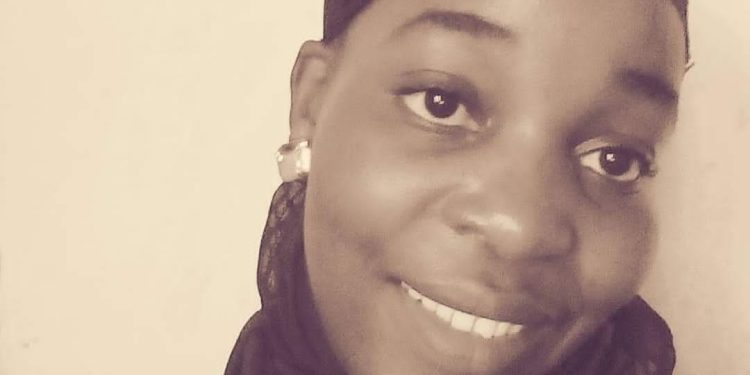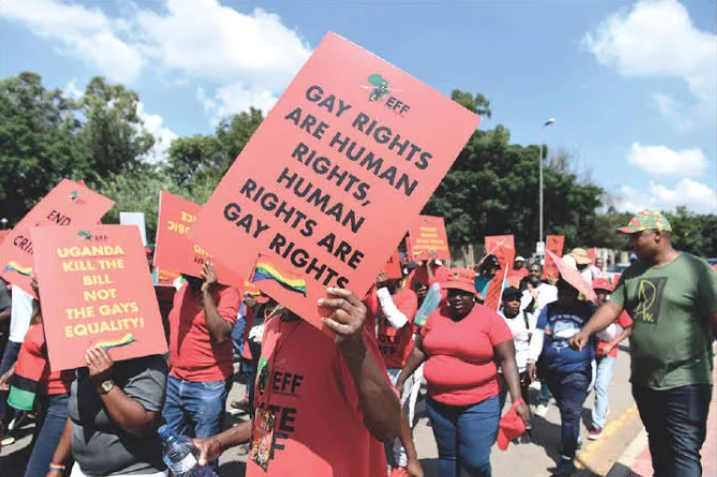By our writer
The Executive Director of UNAIDS and under secretary general of the United Nations , Ms Winnie Byanyima has vowed to stand in Uganda parliament’s way as it moves to sharpen knives against lesbians and homesexuals.
This follows a move by Ugandan parliament to retable the LGBTI bill to completely criminalize lesbians and homesexuals in the country.
On her tweeter handle last week, Byanyima also wife for FDC party founder, Dr Kizza Besigye blasted uganda’s parliament over LGBTI moves and challenged it to emulate the Kenyan parliament which soften on gay rights.
This comes at a time when lesbians and homesexuals in Uganda are living in great danger of their lives with both security and community hunting them down.
As a result many have been linched ,others attacked while a lucky few have fled the country.
This followed President Yoweri Museveni signing into law a bill toughening penalties for gay people in the last decade.
Although Western governments have condemned Mr Museveni’s decision to approve the bill, the situations have remained harsh for gay community.
Uganda is a deeply conservative society where most people oppose homosexuality.
Homosexual acts were already illegal in Uganda, but the new law bans the promotion of homosexuality and covers lesbians for the first time.
In 2011, Ugandan gay activist David Kato was killed in what rights activists said was a homophobic attack.
His name had appeared on a list published by the now-defunct Ugandan Rolling Stone magazine, calling for the execution of gay people.
In 2014 police arrested about 16 people who were attending a gay wedding in Wakiso , central Buganda including the gay brides and their fate was sealed in court with about three of them dying in custody.
In 2016 , Allen Nabwami was bruttaly attacked by a mob who put her on fire and rapped her and her life was only saved by a bodaboda cyclist who later again reported her to police in Kasangati , central Uganda.
She was later arrested with her wounds and vaginal decay and only got a temporary freedom when her friend bribed security to secure a police bond.
Since then Nabwami has gone missing with lumors that she fled the country but the community and security still scouts her known relatives to re arrest her since it’s alleged that she was the cause of murder to her girl paterner Josephine who was also killed by a mob.
The two love birds had started way back in Gayaza S.S until the school discontinued them but kept their game until fate dawned on them.
According to the BBC’s Ali Mutasa years ago, Uganda has well over 400 master homosexuals with many of them now living abroad legally or otherwise confirming the Red pepper article of a homosexual list which leaked.
The list also included some Ugandans who previously had not identified themselves as gay, the Associated Press news agency reported.
“The media witch-hunt is back,” tweeted Jacqueline Kasha, a prominent Ugandan lesbian activist who appeared on Red Pepper’s list by then.
Well-known gay rights activist Pepe Julian Onziema was also on the list, along with a popular hip-hop star and a Catholic priest, AP reports.
Museveni’s move was equally condemned by the US Secretary of State John Kerry by then who said that his decision to sign the bill was a “tragic day for Uganda and for all who care about the cause of human rights”.
“Now that this law has been enacted, we are beginning an internal review of our relationship with the Government of Uganda to ensure that all dimensions of our engagement, including assistance programmes, uphold our anti-discrimination policies and principles and reflect our values,” said Kerry in a statement.
Sweden’s Development Assistance Minister Hillevi Engstrom called Mr Museveni’s decision “terrible” and said that direct aid to Uganda, worth about $10.8m, could be withdrawn.
As a result of the new law, the Netherlands has stopped a $9.6m subsidy to Uganda’s judicial system.
Norway and Denmark said they would transfer direct aid – together totalling about $17m – to non-governmental organisations.
However Mr Museveni signed a watered-down version of the bill on Monday, which includes life sentences for gay sex and same-sex marriage.
However, a clause criminalising those who do not report gay people was removed as well as a proposed sentence of up to 14 years for first-time offenders.
Earlier, government spokesman Ofwono Opondo told Reuters news agency Mr Museveni wanted “to demonstrate Uganda’s independence in the face of Western pressure and provocation”.
The sponsor of the bill, MP David Bahati, insisted homosexuality was a “behaviour that can be learned and can be unlearned”.
In a country where the climate for LGBTI people was already hostile and discriminatory, LGBTI people have faced a notable increase in arbitrary arrests, police abuse and extortion, loss of employment, evictions and homelessness, and scores have fled the country. At least some transgender peoplr have been killed since the bill was signed, in an apparent hate crime.
Health providers have cut back on essential services for LGBTI people, who also fear harassment or arrest if they seek health care. The passing and promoting of this discriminatory law as parliament may wish has not only opened the floodgates for a range of human rights violations against LGBTI people in Uganda, but has also ensured that victims of these violations are denied access to effective remedies. Sexual Minorities Uganda (SMUG), a Kampala-based organization, stated in a recent report that “the full force of the State, particularly the legislative and executive branches of government, is being used to hunt down, expose, demean and suppress Uganda’s LGBTI people.”
“The Anti-Homosexuality Act is creating homelessness and joblessness, restricting life-saving HIV work, and bloating the pockets of corrupt police officers who extort money from victims of arrest,” said Neela Ghoshal, senior LGBT rights researcher at Human Rights Watch. “Repealing this law is imperative to ensure Ugandans can live without fear of violence and harassment.”
Human Rights Watch and Amnesty International conducted research in Kampala and other Ugandan towns in April 2014, interviewing 38 individuals directly affected by the passage of the Anti-Homosexuality Act, four lawyers and paralegals, and four organizations that provide health services to LGBTI people. Human Rights Watch also interviewed eight LGBTI Ugandans in Nairobi, Kenya, who had fled Uganda between January and March 2014.



